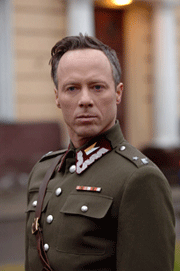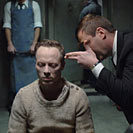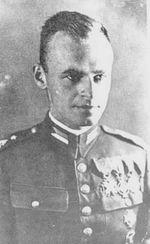By: debbie lynn elias

Witold Pilecki was a soldier of the Second Polish Republic, a founder of the resistance movement known as the Secret Polish Army and ultimately a member of the post Word War II Home Army. A decorated captain by the age of 38, he is the only known person to volunteer to become imprisoned at Auschwitz.
In 1940, in a private meeting with his immediate superior officers, Pilecki discussed one of the craziest and most dangerous plans ever conceived. Prior to this time little was known by the Allies of the true nature and goings-on at Auschwitz. Was it a prison? Was it an interment camp? It was Pilecki’s idea to get arrested, enter the camp, find a way to filter information outside the camp and at the same time promote prisoner morale, aid in providing relief work such as extra food and medicine, train fellow prisoners in combat in the event of an Allied raid on the camp, provide intelligence data, and above all, always pressing on with his beliefs in freedom.
 On September 19, 1940, under an assumed name thanks to fake ID’s provided by the Polish Army, Captain Witold Pilecki aka Tomasz Serafinski was arrested along with 2200 civilians, tortured and brutalized at the Wehrmact barracks before ultimately being sent to Auschwitz only two days later. Amazingly, Pilecki survived the initial tortures only to find himself plunged into a bigger hell. Tattooed with prisoner number 4859, Pilecki organized an underground Union of Military Organizations known as ZOW. Unfortunately, the hopes of ZOW fell short when it was ultimately realized that there would be no outside relief drops, military attack or any other form of landing by the British based Polish 1st Independent Parachute Brigade or anyone else.
On September 19, 1940, under an assumed name thanks to fake ID’s provided by the Polish Army, Captain Witold Pilecki aka Tomasz Serafinski was arrested along with 2200 civilians, tortured and brutalized at the Wehrmact barracks before ultimately being sent to Auschwitz only two days later. Amazingly, Pilecki survived the initial tortures only to find himself plunged into a bigger hell. Tattooed with prisoner number 4859, Pilecki organized an underground Union of Military Organizations known as ZOW. Unfortunately, the hopes of ZOW fell short when it was ultimately realized that there would be no outside relief drops, military attack or any other form of landing by the British based Polish 1st Independent Parachute Brigade or anyone else.
Escaping from Auschwitz in April 1943, Pilecki eventually returned to the intelligence department of the Home Army where he supplied them with detailed reports (much as he had done during his incarceration) of the atrocities that were committed at Auschwitz. With the Allied forces in disbelief at his allegations, it was the consensus of all that he “grossly exaggerated” the situation.
 Ultimately joining a secret organization within the Polish Home Army aimed at thwarting a Soviet takeover, Pilecki was a major part of the Warsaw Uprising and then in 1945, again volunteered to serve General Anders of the “Anders Army” with hopes of staving off communism and Soviet occupation. Much as he had done in Auschwitz, Pilecki took it upon himself to gather information, this time on the Soviet gulags, for forwarding to the West. Unfortunately, on May 8, 1947, he was again arrested, but this time by his fellow countrymen with accusations of, among others, espionage. On May 25, 1948, he was executed.
Ultimately joining a secret organization within the Polish Home Army aimed at thwarting a Soviet takeover, Pilecki was a major part of the Warsaw Uprising and then in 1945, again volunteered to serve General Anders of the “Anders Army” with hopes of staving off communism and Soviet occupation. Much as he had done in Auschwitz, Pilecki took it upon himself to gather information, this time on the Soviet gulags, for forwarding to the West. Unfortunately, on May 8, 1947, he was again arrested, but this time by his fellow countrymen with accusations of, among others, espionage. On May 25, 1948, he was executed.
Based on factual historical events, “Death of Captain Pilecki” gives new life to the story of Witold Pilecki. Long buried in the rubble of war and suppressed by communist leaders, it was not until the late 1990’s that the archival documents of the military trial of Captain Pilecki came to light. Contained among the much-falsified trial proceedings were the actual journals and documents prepared by Pilecki over the years – all of which controverted the findings of the court and showed Pilecki for the man he truly was – an unsung hero.
Mark Probosz stars as Witold Pilecki. With an uncanny resemblance to the real Pilecki, Probosz is intensely compelling. With a large portion of the film done by way of court proceedings and one-on-one dialogues between the head tribunal judge and Pilecki, Probosz exerts a confidence and pride that, based on the archival documentation, must certainly exemplify a man of Pilecki’s integrity.
Written and directed by Ryszard Bugajski, the film is informative and interesting, although often disjointed at times. Using Pilecki’s trial following his final arrest as a means to tell the story, numerous peripheral characters are shown, but never fully introduced until over an hour into the film. Suddenly, some of the pieces of the courtroom drama finally fall into place. Bugajski does an excellent job of telling the factual details of the story, but falls short when adding in concurrent parallels, such as Pilecki being unable to write because of his fingers injured by torture and his daughter being unable to write a paper on how Stalin appreciates women; or the niceties and upper class possessions found in Pilecki’s home. He provides ideal opportunities for some socio-political statements, but doesn’t always follow through. There could have also been more depth in the relationship between Pilecki and his wife, who he failed to tell about his “volunteering efforts” thus creating an unexplored rift in Pilecki’s love of country versus love of family. Again, brief mention is made, and then no follow through.
Integrating actual footage of post-war Poland initially sets the stage after a brief prologue, which grabs one’s attention with an impacting visual statement. Piotr Sliskowski’s cinematography then solidifies not just the physical time and space of the film, but the emotional and psychological edge of the events. With pallid tones, desaturation, varied tonal lighting – the essence of the film is conveyed even without understanding Polish or reading sub-titles. A little over the top, however, is the make-up when depicting the tortures to Pilecki. With the desaturation of the film, the bloodied bruises have a tendency to lose any look of authenticity.
Marking its American debut at the 7th Annual Polish Film Festival held in Los Angeles in early May, “Death of Captain Pilecki” joins the ranks of other small, independent films that celebrate life, liberty and the indomitable human spirit in the face of adversity. And although not disclosed in the film, for the record, Captain Wiltod Pilecki was pardoned and acquitted on October 1, 1990 and posthumously awarded the Order of Poland Reborn in 1995.
Written and directed by Ryszard Bugajski. Unrated. (90 min)
Photos © 2006 – All Rights Reserved












